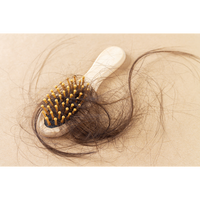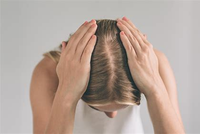Why do women experience hair loss after menopause?

Hair loss is a natural part of life's transitions, and menopause is no exception. However, the story behind why women experience this shedding phenomenon during this stage is far more intricate than just a simple "hormonal imbalance." Let's delve deeper into the fascinating world of menopausal hair loss and uncover the science, the myths, and the surprising factors that contribute to this common yet misunderstood issue.
The Hormonal Tango:
At the heart of the menopausal hair loss saga lies a hormonal tango, where estrogen and progesterone take center stage. These hormones, renowned for their roles in fertility and feminine health, also play a vital role in maintaining luscious locks. When menopause arrives, it brings with it a decline in the production of these hormones, leading to a slow dance of hair thinning and loss.
But here's the twist: as estrogen and progesterone bid farewell, another troupe of hormones, known as androgens, steps into the spotlight. Among them, the infamous DHT (dihydrotestosterone) takes the lead, orchestrating a symphony of follicle shrinkage. The result? A recital of hair loss on the scalp, while paradoxically sprouting unwanted hairs on the chin and other unexpected places.
The Battle Beyond Hormones:
Yet, the plot thickens beyond hormonal fluctuations. Menopausal hair loss isn't merely a solo performance by estrogen and androgens; it's a multidimensional narrative influenced by an ensemble cast of factors.
Picture this: a menopausal woman, juggling the demands of her changing body, career, and family, all while navigating the choppy waters of stress. This psychological strain isn't just a fleeting emotion—it's a silent contributor to hair loss, triggering a cascade of physiological responses that disrupt the delicate balance of hair growth.
Furthermore, the body's nutritional orchestra must play in harmony to maintain healthy locks. Deficiencies in essential vitamins and minerals, such as iron, vitamin D, and biotin, can throw this symphony off-key, leaving strands frail and prone to breakage.
And let's not forget the role of medicine in this tale. While pharmaceutical interventions promise relief from menopausal symptoms, some medications unwittingly play the role of the villain, sabotaging hair follicles and leaving behind a trail of unintended consequences.
Conclusion:
In the grand narrative of menopausal hair loss, hormones may take top billing, but they're not the sole protagonists. Behind the scenes, stress, nutritional deficiencies, and medication sensitivities weave a complex tapestry that shapes a woman's experience during this transformative stage of life.
As we unravel the mystery of menopausal hair loss, let's not overlook the individual stories woven into this collective tapestry. Each strand of hair lost or gained carries with it a unique journey—a testament to the resilience and adaptability of the human body in the face of change. So, to all the women navigating the twists and turns of menopause, may your journey be filled with grace, resilience, and, of course, fabulous hair.





